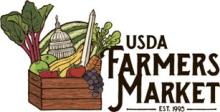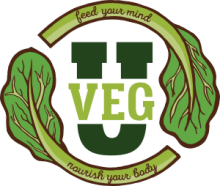The garden located on the corner of Jefferson Drive and 12th Street, S.W., Washington D.C. educates the public about sustainable gardening practices. The garden showcases food grown in containers for small urban spaces, raised beds for community plots, and fruit trees.
Meet the People’s Gardeners at USDA Headquarters
Ben Anderson, USDA People’s Garden Manager
Ben Anderson manages the planning and maintenance of the People’s Garden in Washington, D.C. His education in horticulture at the University of Maryland, College Park guides his plans for the garden with a goal of creating a space that is both beautiful and productive. In addition, Ben aspires to make the garden an educational space, showing the science behind growing plants.
Natalie Howe, USDA Plant Materials Center Manager
Natalie’s team at the Plant Materials Center conducts research that helps gardeners, farmers, and ranchers manage their lands to benefit soil health, water quality, and wildlife habitat. The Plant Materials Center oversees the management of the Headquarters People’s Garden.
Volunteer!
There are a variety of volunteer activities at the Headquarters People’s Garden, including planting fruits, vegetables and flowers; seeding, pruning, general garden upkeep; harvesting.
What to bring? Water, gloves, enthusiasm!
Interested in volunteering? Sign-up for email updates on the latest volunteer schedule by completing the USDA Headquarters People’s Garden Volunteer Interest List.
Visit the USDA Farmers Market on Fridays, 9 a.m. to 2 p.m. (May through October) to sample local produce and prepared foods.
VegU is a popular 10-minute weekly class that teaches how to grow, pick, prepare, and store different fruits and vegetables. Get VegUcated!
Conservation
The People’s Garden team incorporates sustainable farming practices that benefit people and wildlife, including nutrient management, soil health, micro-irrigation, pollinator habitat, and cover crops. The tool shed was built from wood repurposed from fallen urban trees in the city. It is topped with a green roof, which was constructed with soil and plants.
- Interested in including conservation practices in your garden. Connect with the USDA Natural Resources Conservation Service.
- Learn more about using reclaimed materials in this blog and the work the U.S. Forest Service is doing to transform “waste” wood.





